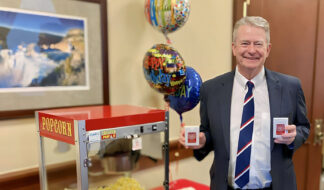by R.J. Beaumia
Contained within my DNA is a propensity for male pattern baldness, for being overweight, and for being gay. The evidence for this is scattered throughout family photo albums in the many snapshots of bearish bald guys, a couple of them confirmed bachelors who had great taste in clothes and a magic touch when it came to growing roses.
I think there's also a little dirt and coal dust in my genetic code. Just two generations ago the men and women of my family were literally hacking an existence out of the earth in the hills of Kentucky. Picture Loretta Lynn's family in the film "Coalminer's Daughter" then subtract the fame, money, and talent from the narrative. Yes, it was that bleak.
Coal company-owned stores charged criminal prices for goods workers were forced to buy there. Sometimes the company withheld work if they didn't like your politics. So, to survive, my people distilled and sold moonshine to make money for buying extravagances like shoes and store-bought soap that wouldn't eat the skin off their infants. They grew and canned their own vegetables and fruit. If they had meat they usually looked it in the eye before they ate it.
Sunday leisure time was spent either drinking or speaking in tongues.
Like so many of their peers, my grandparents migrated to Michigan right after World War II to partake in the booming industrial and economic miracle of the north. My grandfather got all the overtime he wanted as a mechanic at the Pontiac dealership. And my grandmother, defying him, her upbringing, and the societal expectations for women at that time, got a job wrapping meat at Kroger where she was pleased to find that she wouldn't have to process squirrel.
My grandmother not only had a job, she had a union job with union protections and union wages and union benefits. Her children had new clothes for school each fall and there was Coca-Cola in the electric refrigerator.
Again defying my grandfather, she bought a new 1952 Ford, blue, with big whitewall tires. She went to the dealership, paid in cash and, having never been behind the wheel of an automobile in her entire 32 years, drove the car off the lot. After practicing for a few days, my grandmother drove alone down to Kentucky to show her parents her new car.
Since then, many people in my family have at one time or another lived in union households. Most relatives from my parents' generation, a number of those in mine, and I have put food on the table by working for Ford, GM, or Chrysler. All are proud to be members of the United Auto Workers, as am I.
The history of Michigan and Detroit is the history of the automobile and unions. We can all argue the pros and cons of the internal combustion engine or about what social movements have done to the working class. However, what's not in dispute is that I, my family and thousands of others owe a decent living, our health, and our dignity as working people to the UAW and to the auto industry.
And we earn every bit of it. The work is physically exhausting, the pressure to perform can push your nerves to the limit, and we're constantly reminded that the competition from foreign companies is the pendulum swinging over the whole pit.
I will not lie; there is racism, sexism, and homophobia to deal with. But, to be honest again and fair, it's not near as bad as you think and it's getting better. The union and the companies have worked together on these issues over the years and made excellent progress. It's certainly much better than it was in my father's era, and it has improved even during my 12 years in the industry.
So, what's it like being a big queer on the assembly line? When I was hired in the early 90s, it could get frightening. There was no anti-discrimination policy covering gays and lesbians from either the companies or the union. An incident that happened to me two years into my seniority shakes me up to this day.
I and another guy, who is African-American, were loaned out to another department at the start of the shift. After we were placed on jobs, I overheard one of the operators, with whom I'd earlier been jovial, chuckling and telling another guy next to him, "Oh man, we're f–ked now – they sent us a [pejorative for African-American] and a faggot."
I blanched with fright. Was I going to get bashed later in the parking lot? Should I tell the African-American guy? At least he could file a complaint and have the bigot disciplined. I chose cowardly-but-self-preserving silence. All I wanted was to get home in one piece and be left alone.
Since then the UAW and the companies have written anti-discrimination language covering sexual orientation into their contracts and policies. Employee work groups and supervisory staff are periodically issued memos at meetings confirming that the union and the company intend to strictly uphold the policy. Jointly-sponsored mandatory diversity training sessions for all employees, hourly and salary, have buttressed this.
But the pinnacle of this collaboration between the UAW and the company is the negotiated same-sex domestic partner benefits we got in 2000. To me this is nothing short of miraculous and shows the power of collective bargaining.
For my union family, it's out of the hills and out of the closet.









